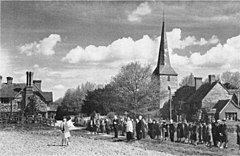Rogation days
| Rogation days | |
|---|---|

Blessing the Fields on Rogation Sunday at Hever, Kent
|
|
| Observed by | Christians |
| Liturgical Color | White |
| Observances | Fasting and processions |
| Date | April 25; Monday, Tuesday, and Wednesday preceding Ascension Thursday |
| 2016 date | April 25; May 2–4 |
| 2017 date | April 25; May 22-24 |
| 2018 date | April 25; May 7–9 |
| Frequency | annual |
| Related to | Ascension Thursday |
Rogation days are days of prayer and fasting in Western Christianity. They are observed with processions and the Litany of the Saints. The so-called major rogation is held on 25 April; the minor rogations are held on Monday to Wednesday preceding Ascension Thursday. The word rogation comes from the Latin verb rogare, meaning "to ask", which reflects the beseeching of God for the appeasement of his anger and for protection from calamities.
The Christian major rogation replaced a pagan Roman procession known as Robigalia, at which a dog was sacrificed to propitiate Robigus, the deity of agricultural disease. The practitioners observing Robigalia asked Robigus for protection of their crops from wheat rust.
The minor rogation days were introduced around AD 470 by Mamertus, bishop of Vienne, and eventually adopted elsewhere. Their observance was ordered by the Council of Orleans in 511, and though the practice was spreading in Gaul during the 7th century, it was not officially adopted into the Roman rite until the reign of Pope Leo III.
The faithful typically observed the rogation days by fasting and abstinence in preparation to celebrate the Ascension, and farmers often had their crops blessed by a priest at this time. Violet vestments are worn at the rogation litany and its associated Mass, regardless of what colour is worn at the ordinary liturgies of the day.
A common feature of Rogation days in former times was the ceremony of beating the bounds, in which a procession of parishioners, led by the minister, churchwarden, and choirboys, would proceed around the boundary of their parish and pray for its protection in the forthcoming year. This was also known as 'Gang-day', after the old English name for going or walking. This was also a feature of the original Roman festival, when revellers would walk to a grove five miles from the city to perform their rites.
...
Wikipedia
